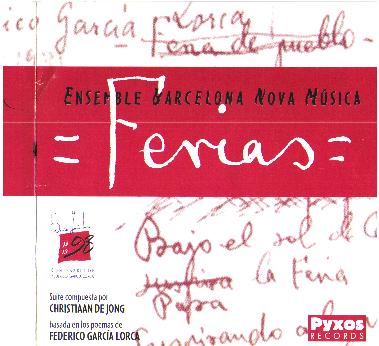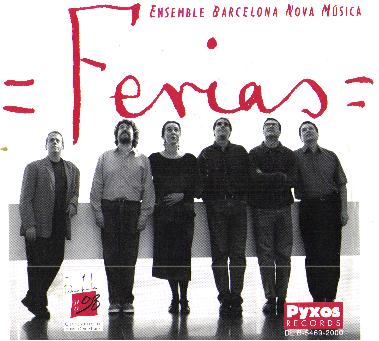![]()
![]()
![]()
![]()
Christiaan DeJong - Ferias. Ensemble Barcelona Nova Música. Christiaan DeJong: transverse flute, baroque flute, electric guitar; Marta Fiol, soprano; Pepe Mira: clarinet, bass clarinet; Javier Olondo Cos: Spanish guitar; Raphael Zweitel, cello; Rafael Esteve: contrabass; Toni Meler: percussion, Christiaan DeJong, conductor. Pyxos Records DLB-5469.2000 (48'21"). For information contact www.arquired.es/users/dejong or write to piim@arquired.es
 Federico García
Lorca(1898-1936) is one of the greatest and most original Spanish poets
of the last century, and a deeply influential figure in the resurgence
of arts and letters in his time. He was also friends with composer Manuel
DeFalla, and two fellow Surrealists -- film director Luis Bunuel (1900-1983)
and painter Salvador Dali (1904-1989), who was also his first lover. Lorca's
impact on his culture is comparable to that of Jean Cocteau (1889-1963)
on his, and like him, he drew. He also transcribed much Spanish folk music,
sang, played the piano, composed, ran an experimental theatre group, La
Barraca, wrote eight books of poems, three classic plays -- Bodas de
sangre (1933), Yerma (1934) and La casa de Bernarda Alba
(1936)
-- as well as a dozen less ambitious ones before he was brutally murdered
by the Guardia Civil. Thoroughly modernist yet completely classical, his
poetry draws on ancient Spanish folk traditions -- the romancero
(ballad), especially the gypsy kind, and the cancion
(song), and
any musical setting must convey the passion and order he got from these
sources as well as his own unique, and very sensual sensibility.
Federico García
Lorca(1898-1936) is one of the greatest and most original Spanish poets
of the last century, and a deeply influential figure in the resurgence
of arts and letters in his time. He was also friends with composer Manuel
DeFalla, and two fellow Surrealists -- film director Luis Bunuel (1900-1983)
and painter Salvador Dali (1904-1989), who was also his first lover. Lorca's
impact on his culture is comparable to that of Jean Cocteau (1889-1963)
on his, and like him, he drew. He also transcribed much Spanish folk music,
sang, played the piano, composed, ran an experimental theatre group, La
Barraca, wrote eight books of poems, three classic plays -- Bodas de
sangre (1933), Yerma (1934) and La casa de Bernarda Alba
(1936)
-- as well as a dozen less ambitious ones before he was brutally murdered
by the Guardia Civil. Thoroughly modernist yet completely classical, his
poetry draws on ancient Spanish folk traditions -- the romancero
(ballad), especially the gypsy kind, and the cancion
(song), and
any musical setting must convey the passion and order he got from these
sources as well as his own unique, and very sensual sensibility.
Dutch composer Christiaan DeJong (1960- ) is one of the latest to set
García Lorca's work. His Ferias is a suite of 13 poems written
one day in 1921 and edited for the first time by Ramon Soley. DeJong's
piece was finished in 1998 which also happened to be the centenary of the
poet's birth, and it's played here by his group Ensemble Barcelona Nova
Música. De Jong's musical influences are many and varied -- everything
from Bach to Pink Floyd and Stravinsky. Still it would be hard to  pinpoint
these, well maybe the Stravisky of The Soldier's Tale (1918). The
visual influence of his "action painter" father is more detectable, and
De Jong's fusing of the seen and the heard fits this highly imagistic and
theatrical poet to a tee. He sets the scene immediately in No. 1, "Poema
de la Feria" with its jaunty flute tune, passages of group singing, and
slapping, percussive effects derived from flamenco, which give a ritualistic
and processive quality to Lorca's evocation of a Spanish village festival.
De Jong uses similar kinds of sounds elsewhere and they're perfect complements
to Lorca's sophisticated lyrics, which tell stories , conjure primal atmospheres,
and project private moments. His writing for soprano Marta Fiol is equally
evocative and requires her to use different vocal registers and different
kinds of attacks (there are widely contrasted spoken sections too).
pinpoint
these, well maybe the Stravisky of The Soldier's Tale (1918). The
visual influence of his "action painter" father is more detectable, and
De Jong's fusing of the seen and the heard fits this highly imagistic and
theatrical poet to a tee. He sets the scene immediately in No. 1, "Poema
de la Feria" with its jaunty flute tune, passages of group singing, and
slapping, percussive effects derived from flamenco, which give a ritualistic
and processive quality to Lorca's evocation of a Spanish village festival.
De Jong uses similar kinds of sounds elsewhere and they're perfect complements
to Lorca's sophisticated lyrics, which tell stories , conjure primal atmospheres,
and project private moments. His writing for soprano Marta Fiol is equally
evocative and requires her to use different vocal registers and different
kinds of attacks (there are widely contrasted spoken sections too).
The composer also accomplishes the neat trick of making the music sound both up-to-date and ancient, especially in numbers like "Cancion Morena" which has a flamenco rhythmic figure on contrabass against (mostly) harmonically extended chords on flute and bass clarinet, and what sounds like a bowed water glass. "Confusion" gets its haunted quality from the combination of contrabass with Spanish guitar and vibes. It has lots of duende -- Lorca's term for an unnamable dark passionate feeling -- but so do several others like "Tambor" with its eponymous drum, but also flute, clarinet and electric guitar (DeJong plays "open form" classical music and jazz too), "Verbena" and "Grito". DeJong shows a keen understanding of musical texture and the music itself sounds like an instinctive response to García Lorca's highly imaginative yet basic poems. Like many composers of his generation De Jong has taken things from Western and non-Western sources including rock as well as the European avant garde. His music unselfconsciously blends these elements -- it's learned but not the least bit academic, and the "seams" between its disparate idioms don't show. The Ensemble Barcelona Nova Música play with clarity, passion and wit. Full texts are included, but only in Spanish.